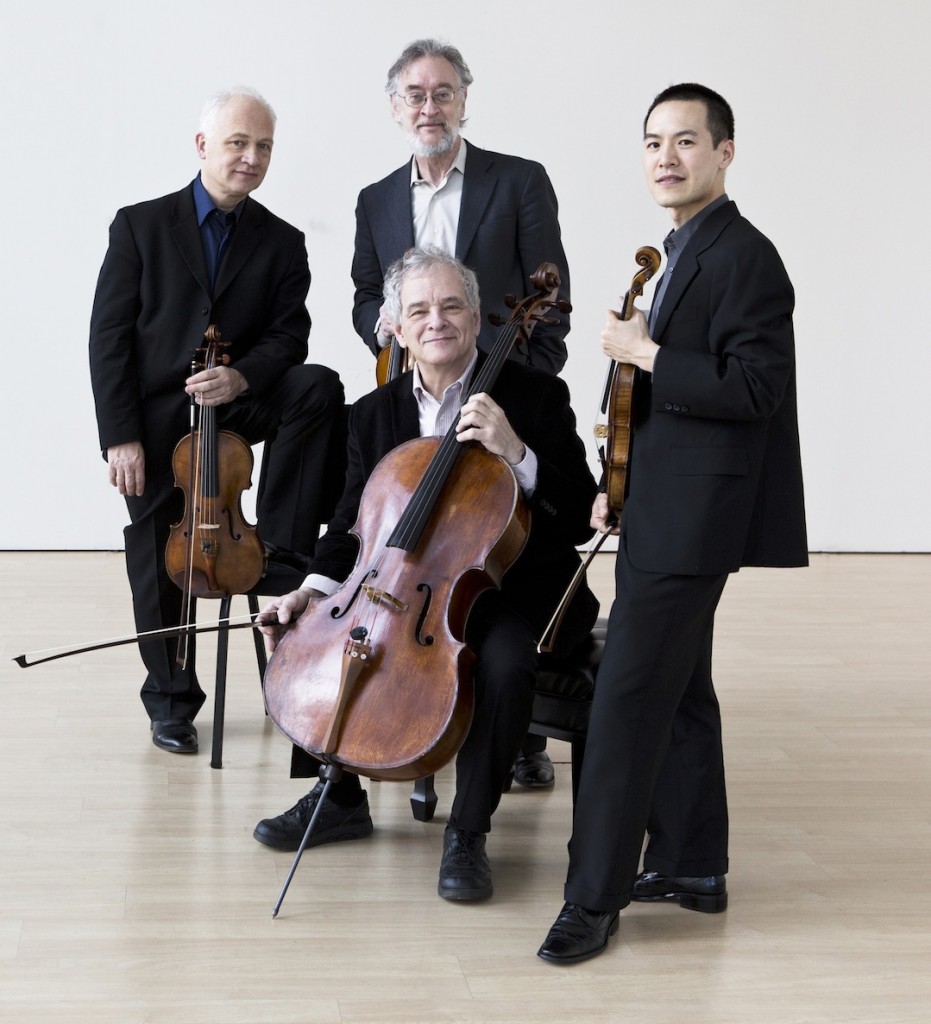Julliard String Quartet finds the spare beauty of Second Viennese School works

The Juilliard String Quartet performed Saturday night at Jordan Hall for the Celebrity Series. Photo: Simon Powis
In its long awaited return to Boston’s Celebrity Series Saturday night at Jordan Hall, the Juilliard String Quartet presented three works that touched on two centuries of Viennese music.
The venerable quartet, which last appeared on the Celebrity Series in 2005, now includes violist Roger Tapping and first violinist Joseph Lin as its newest members. Together, the current foursome continues the ensemble’s sterling tradition of multifaceted programming. Yet within their wide range of repertoire, the music of the Classical and early-twentieth-century Viennese masters remains something of a Juilliard Quartet calling card. Vivid and thoroughly colorful, Saturday’s program delivered rich musical rewards.
Two works from the Second Viennese School, Webern’s Five Movements, Op. 5 and Berg’s String Quartet, Op. 3, filled the first half of the evening.
Anton Webern’s music, known for its outwardly sparse and astringent style, remains something of a pariah for concertgoers. His atonal works, however, are aglow with shimmering instrumental colors and a compact, but audible lyricism: compressed romanticism at its finest
The Five Moments (1909) are among the first works Webern composed after he concluded composition studies with Arnold Schoenberg. The music is bewildering. Its slow movements feature silvery strands of melody that flow gracefully between the violins, viola, and cello. In other passages, sudden percussive bursts evaporate into clouds of ghostly sul ponticello phrases. The third of the set is a brief but emotionally charged exchange of violent statements, and the chilly fifth brims with nuggets of dark lyricism. Through it all, the Juilliard Quartet played with notable aplomb.
Alban Berg, perhaps, is the composer of Schoenberg’s circle who carried over the techniques of classical-romanticism most fluently. His String Quartet, Op. 3 (1910), written when he was 25, is a searching and beautiful work. The Juilliard Quartet delivered the full drama laden within the score, coloring the swirling lines of the first movement with burnished tone and crafting each lyrical phrase with spellbinding focus. They dug in for the more aggressive music that fills the second of the two movements, the lines radiating with a mahogany ensemble quality that rang full in every register.
The second half of the concert was dedicated to Schubert’s String Quartet in D minor (1824), the famous “Death and the Maiden” quartet.
So named because of the second movement, a set of variations on a song the composer penned in 1817, the work is expansive in its death-haunted melancholy. The Juilliard Quartet found the delicacy in the first movement’s gently skipping melodies and mined the inner drama from the agitated music that came in the development. The doleful strains of the second movement’s theme were given tender treatment. The highlight of the five variations was Joseph Lin’s solo phrases, which crested and broke like waves over the lightly churning accompaniment supplied by the other musicians. The third movement Scherzo had the romp of a rustic dance, and the rippling lines of the finale were played with vitality. The performance was superb, the interpretation as clear as a country creek.
The musicians offered a single encore, a dreamy rendition of the Largo cantabile from Haydn’s String Quartet, Op. 33 No. 5.
The next classical music event presented by the Celebrity Series will feature pianist Vadym Kholodenko performing music by Handel, Mozart, Beethoven, Debussy, and Balakirev 8 p.m. October 29 at Pickman Hall. celebrityseries.org; 617-482-6661
Posted in Performances